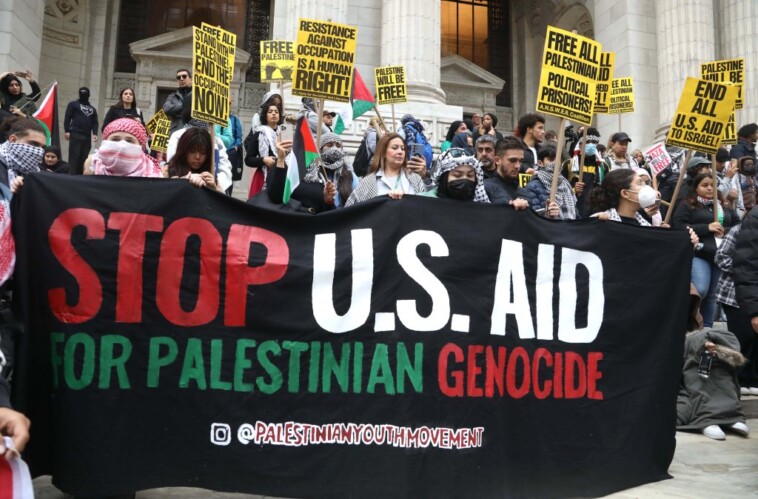A shocking 61% of American Jews have encountered an explosion of antisemitism after the Oct. 7, 2023, terror attack on Israel, a disturbing new poll shows — and some of their stories are nothing short of chilling.
Nearly 40% of the people surveyed who either have college kids or are students themselves reported instances of feeling unsafe on campus — with many adding they avoid wearing items that would identify them as Jewish out of fear.
More than 20% of respondents said their younger children have borne the brunt of the antisemitism in the past year, too.
“Everyone has been touched, and what happened in Israel didn’t just stay in Israel, obviously,” said Allan Ripp, a former journalist who was riding a Citi Bike in Central Park in Manhattan in July when an antisemitic goon slugged him and called him a “f–king dirty Jew pig.”
“I know I’m gonna be cautious [Monday],” he said. “Based on what these groups have said, there could well be some incidents, so I think we’re gonna just be watchful. I don’t want to ride the subway tomorrow, I don’t want to be in a place where there’s a lot of large gatherings.”
Misha Galperin, a member of the board of governors of the Combat Antisemitism Movement, which contracted the study by Professor Ira Sheskin of the University of Miami and the National Opinion Research Center at the University of Chicago, said, “The explosion of anti-Jewish hate since Oct. 7 in this country has profoundly impacted individuals, families, and communities.
“The extent of that impact on American Jews documented by this survey is simply stunning.”
Ripp said he did see something positive to come from the hate, though.
“In terms of my personal reaction, I’ve actually been heartened by the feeling that Jewish community has rallied and there are very vocal friends and supporters of that community who have stood up,” he said.
Manhattan restauranteur Raif Rashad, who witnessed the horrifying Oct. 7 terror attack in Israel, said he will mark the grim anniversary with what he described as a bittersweet “victory.”
Rashad, 40, was working as a caterer at the Nova Festival in Israel when it was attacked — and lost at least 20 friends while barely escaping with his life. He said he saw the Hamas terrorists gun down innocent victims and even lynch one Israeli man.
On Sunday, he opened Grand Bazaar, a Druze restaurant, on West 77th Street in memory of the day he will never forget.
“It is a hard day for me,” Rashad said. “It is hard for my head to be where my body is. It has been hard days this whole year. Today, I am one minute thinking of my friends who I lost, one minute I am thinking how lucky we are to be here today opening this.”
The newly released poll included several open-ended questions asking its 1,075 respondents how they would describe their own clashes with Jewish hate in the past 12 months:
–“I was told by a customer at my retail workplace that they didn’t want a Jew scanning their items after seeing my Star of David necklace,’’ a Jewish worker wrote.
“I called my manager over because I didn’t know what to do and was scared and my manager (who has been antisemitic many times in the past) just said, ‘I completely understand’ and personally checked her out on a different register.”
–“I was on the subway, and someone was sitting in front and literally telling me I should kill myself, God hates me, God hates the Jews and some other vivid words about what awful people we are, and we should just kill ourselves,’’ a straphanger said.
–“My daughter’s preschool, which is on the grounds of a synagogue, was threatened with violence,’’ a parent wrote. “We had to pull her out of school and find an alternative.”
The new survey said 43% of the respondents indicated that the increased antisemitism will impact how they will vote in the November elections.
Some of the Jews who usually vote Democrat — 7.3% of respondents — said they will now vote Republican, while 3.9% who previously voted Republican said they will vote for Democrats.
The poll noted that a quarter of the Jewish respondents said they have experienced the hate close to home — in their own neighborhoods. That figure is more than double the 12% from prior surveys.
On college campuses, in addition to the worrisome trend of feeling unsafe, nearly a third of the students surveyed said they felt discriminated against or made uncomfortable by their own professors because they were Jewish.
A quarter felt excluded from campus activities because of their views or faith, the survey showed.
Of the overall 61% of American Jews who have experienced antisemitism since the Oct. 7 attack, Jewish Columbia University student Marc Nock scoffed to The Post on Sunday, “I think that number is actually low.”
He added that he refuses to be bowed.
“I’m a born and raised New Yorker. I’ll be damned if I am going to change my behavior because of a bunch of bigots,” he said.
Davian Geikman, a 19-year-old sophomore at Cornell University, conceded that the past year has been difficult for Jewish students there — but said it has also rallied the community.
“It makes me more proud of being Jewish,” Geikman said. “The only way to beat antisemitism is fight it.”
Israel War Update
Get the most important developments in the region, globally and locally.
Thanks for signing up!
One in the survey’s five respondents — 21% — said they were called offensive names because they are Jewish, an increase from 15% in a prior Pew Research Center survey in 2020.
The growing sense of insecurity has led to changes in behavior, the survey showed.
More than a quarter, or 27%, of respondents said they now avoid displaying their Jewish identity in the workplace, up from 18% in a survey before Oct. 7. One in five respondents said they have skipped religious observances or events out of fear.
”This survey emphasizes the number of Jews impacted by antisemitism rather than just the number of incidents,” said Ira Sheskin, professor of geography and the director of the Jewish Demography Project at the Center for Contemporary Judaic Studies at the University of Miami.
“The results are deeply concerning and highlight the need for immediate action to address rising antisemitism in America,” he said.
The survey was conducted through online and live phone interviews from Aug. 12 to Sept. 3. It queried Jews across the religious and cultural spectrum: orthodox, reform, conservative and others.
It has a margin of error of plus or minus 4.12 percentage points.
The one-year anniversary of the attacks has pushed the NYPD and state troopers to a “zero tolerance” alert, particularly at houses of worship and other Jewish targets, city officials said last week.
Police data show that complaints of antisemitic incidents in the five boroughs have spiked in the past year, with 275 through the end of September this year compared to 157 over the same period last year.
So far in 2024, complaints about antisemitic incidents have accounted for nearly 56% of all bias complaints in the city, up from 41% over the same span in 2023.
“The strange thing about all of this is that this has made me prouder to be Jewish,” said Amy Cook, a 44-year-old on the Upper West Side who said she’s been called a “genocidal Nazi” for posting posters of the Americans kidnapped by Hamas.
“Being targeted has oddly enough strengthened my connection to my faith and background,” she said. “We were told for decades that antisemitism would come roaring back, and I’m still astonished and surprised by what has happened to us.”
Additional reporting by Kevin Sheehan, Amanda Woods, Doree Lewak and Georgett Roberts














